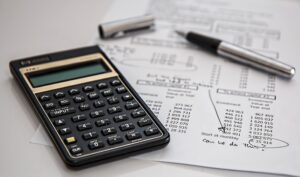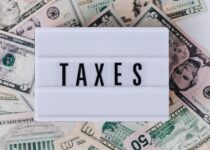Strategies to Track Your Expenses

“This post may contain affiliate links. If you use these links to buy something we may earn a commission but you may gain some knowledge.”
Tracking your expenses is one of the most vital components in making your budget work for you. If you are one of those people who get to the end of your money and have too much month left and don’t know where it went, this article is for you. We are going to take a look at a few strategies to track your expenses every month.
The idea of tracking your expenses and not overspending is primarily to help you reach your financial goals. There always seem to be bills that have to be paid every month and believe it or not, life just happens sometimes. As common as this is, it’s amazing how many people don’t plan for these everyday expenses.
Today, fifty-seven percent of Americans can’t even cover a $500 emergency expense without going into debt. This is the type of situation that arises from poor planning. You have to be the one in charge of your money. If you let your money control you, it will lead you down the wrong path every time.
There are plenty of free apps out there to help you set a budget and track your expenses. I personally use Mint. This app allows you to tie a bank account to the app that will track your expenses from that account and send you alerts that let you know when you are getting close to going over your budget that month for different types of expenses such as groceries, fuel, or eating out.
The bottom line is, you need to set a budget and stick to it in order to improve your financial situation be able to pay for the things you need. If you don’t change the way you have done things in the past, you won’t change the way your future looks.
List Out Your Expenses
The first thing to do is make a list of all of your expenses. Break down your month-to-month expenses that have to be paid. Examples of this would be rent/mortgage, utilities, car payment, groceries, phone bill, insurance, etc. After you have listed out all of these expenses, make a list of all of your variable expenses. Examples of these may include, travel, eating out, coffee, clothing, hobbies/activities, etc.
After you have all of these costs listed out with their expense, you will begin to visually see where your money is going. For your variable expenses, use your past three bank statements to write down what you have spent on those types of expenses in those months. For many of you this will be an eye-opening experience.
I have a feeling that for most of you, your variable monthly expenses are what is making it difficult, or seem to be difficult, to pay your hard-monthly expenses. You have to make your hard-monthly expenses a priority, you can’t not have a plan for your money and go about the month without a plan and then be surprised when you don’t have enough money at the end of the month to pay the next moths rent, or the phone bill.
With having everything written out and being able to visualize and see where your money is going, it will be easier to make cuts and set your priorities. If you are committed to your budget and growing your wealth, these decisions should be easy, sticking to your budget will be the hard part.
Record Your Expenses Throughout the Day
Keep track of your day-to-day expenses. Doing this will help you stick to your budget. If you are recording what you spend and what you spend it on, it will begin to make you consciously think about whether or not it is something you should be spending that money.
Like I said before, there are several free apps that will do this for you but it is also very easy to do it yourself with a piece of paper or an excel spreadsheet. If you haven’t had a bank account up until this point and weren’t able to check your statements above, this will help you see where your money is going, and where you can more efficiently limit your spending.
The idea is to see how those little expenses that you don’t think about add up throughout the month. I’m talking about those $6 cups of coffee and those $8 trips to the convenience store, and the worst one of all, eating out. If you are trying to save some money and pay off some debt, these are going to be the easiest and most necessary items to cut from your spending.
Create Your Budget
After you have a better idea of what your expenses are and what your income is, you are now ready to sit down and create your budget. You obviously have your hard expenses that can’t be changed, but you can really dig into your variable expenses and cut out a lot of the fat.
You will need to set yourself to a limit in every category. Give yourself a set amount you can spend on clothing, eating out, travel every month and stick to it. You don’t need, cable, Netflix, Hulu, amazon prime, and Disney plus. Look at your phone bill, do you really need a smart plan with unlimited everything. The answer for 75% of us is, no. Really look at what you are spending your money on and figure out where you can cut your spending.
The most important thing to remember that this only has to be temporary, but after doing it for a while you will start to develop good habits and begin to think differently.
Stick to Your Budget
You have not created your budget, stick to it! You are going to find that this is going to be a lot more difficult in the long term than it sounds. You have created a plan for your money, you must control it or it will control you. After a few weeks you will be tempted to stray from your budget. You will say to yourself, I have been good, I can treat myself. You must fight this temptation.
It is the time in your life to start developing good habits. Keep tracking your expenses. You will begin to realize a few things. Those things that you thought you just had to have before suddenly aren’t’ that important and the best thing is, you will start to have more and more money left over at the end of the month.
Remember that the first budge you create is not set in stone. You will continue to find areas that you can cut back on and you will find other interests that will cause you to change your budget.
Tips
Stop Using a Credit Card
If you are the type of person that has a difficult time sticking to your budget, get rid of your credit cards. At this point they will most likely only get you into trouble. Your goal hear should be to build an emergency fund that will replace your need for a credit card.
Once you have developed good habits, and through this process improved your credit score, there will be plenty of offers out there when you are ready. Let’s face it, it’s very difficult to do much without a credit card anymore and it is much safer for you to use than a debit card but you first must learn to develop good habits with your credit card.
Use Nothing but Cash
If you really have a problem and can’t control your spending with the debit card that is tied to your checking account this tip might be for you. With this method you will separate your cash into envelopes containing the designated amounts you have budgeted for that expense.
For instance, you would have an envelope for rent, utilities, groceries, gas, phone etc. If your rent is $500, then you would put $500 in that envelope until it is time to pay rent and then you would pay it. If you’ve budgeted $200 for groceries, you would put $200 in that envelope and take some money out every time you needed to go to the grocery store and so on down the line.
There are some bills these days that are very difficult to pay with cash and money orders are very expensive to send out so I wouldn’t recommend using this method for the long term but you can start with it and phase it out as you gain more discipline.
Use Technology
As I mentioned above, there are several apps out there that allow you to automated this whole process. They are easy to use and lend suggestions as to how much you should be spending in certain areas.
I personally use Mint and it is a great app to use. You can tie your bank account, credit cards as well as investment accounts to your account and manage everything from one spot. You can set it up to alert you to when you are getting close to going over your budget.
You can even enter your bills and it will alert you when your bills are due. They have even added features that allow you to track your credit score and apply for financing. I can’t speak to many other apps but here is a list of the top-rated apps by current users.
Top 5 Money Tracking Apps
1) Mint
2) GnuCash
5) Buddi
Get an Accountability Partner
If you are married this should be something you are already doing. It will be very difficult to stick to a budget if your spouse is not on board. In most relationships there is usually one person that keeps track of everything and one that never looks or asks about the finances.
This should not be the case, both members need to be involved in the tracking and management of the household budget. Doing this will make both of you conscious about how money is spent and improve communication on the subject.
If you are not married or have a life partner, find a friend or someone else that is working on their financial situation and be each other’s accountability partners. Get together and discuss your progress and the struggles you have had. With technology these days, this is pretty easy to do.
Decide What to do with Your Extra Money
Now that you have studies and implemented these strategies to track your expenses you get to enjoy the benefit. It is now time to decide what to do with your extra money. By now you should have your emergency fund build up, the next step I would recommend is aggressively paying off consumer debt.
This is paying off credit card balances, auto loans, student loan debts, or any other debt you may have other than a mortgage. I would recommend the snowball payment method to accomplish this. Once you have paid all of this debt off I would suggest that you build up a fund of about six months of expenses. Put this money in an account that is not easily accessible.
Once you have all of this accomplished, it is time to look at alternative investments. You should budget to invest at least 10 percent of your monthly income to investments. That could be an IRA, 401(k), stocks, real estate or whatever investments that interest you. Just remember that you can’t accomplish all of this in one day and persistence is the key.




